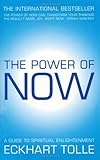The Power of Now: A Guide to Spiritual Enlightenment
- New
- Mint Condition
- Dispatch same day for order received before 12 noon
- Guaranteed packaging
- No quibbles returns
The bestselling self-help book of its generation, Eckhart Tolle demonstrates how to live a healthier and happier life by living in the present moment.Ekhart Tolle’s message is simple: living in the now is the truest path to happiness and enlightenment. And while this message may not seem stunningly original or fresh, Tolle’s clear writing, supportive voice and enthusiasm make this an excellent manual for anyone who’s ever wondered what exactly “living in the now” means. Foremost, Tolle is a worl
List Price: £8.99
Price: [wpramaprice asin=”0340733500″]
[wpramareviews asin=”0340733500″]




Here and Now,
After reading happiness books like “Finding Happiness in a Frustrating World“, I felt like I had a good handle on what science had uncovered about how to live a happy life and have to say that I am MUCH happier for having read them. But, while the field of positive psychology has made some great contributions to my happiness levels, it’s books like The Power of Now that come along and let you know there’s STILL more you can learn.
A key concept of the book (if I’m explaining it right) is that you will start to experience a certain kind of enlightenment when you learn to leave your analytical mind behind. In other words, instead of “thinking” try just “observing your thinking.” And when you do this, you also need to realize that all this “thinking noise” that goes on in your head all day long is not really who you are- an enlightening concept indeed!
To that end, the book is set up in a question and answer format to help you get to understand these kinds of concepts. While it might seem ridiculous to some, it really isn’t. Case in point, we all talk to ourselves or have witnessed others talking to themselves at times (maybe during a sporting event perhaps). If you ask someone who they are talking to, they will usually say “I’m talking to myself.” And this, by definition, means that there have to be two “selves”, an “I” talking to “myself”- and so justifies the idea of two selves (a “you” and a “thinking you” in the book).
Well, if these seem to be the kind of concepts you’re ready to explore, this is your book. It raises some good questions and certainly brings up one that you can’t argue with: all we have is the here and now. As the book so astutely points out, “Nothing ever happened in the past; it happened in the Now. Nothing ever happened in the future, it will happen in the Now.” And learning to live in the now IS the point of the whole book.
Was this review helpful to you?

|Not the best book on Zen,
There are some things to like in this book. Some of his ideas are interesting.
Most of us could probably benefit from being in the present a bit more and not always thinking about the future and regretting the past.
Unfortunately a lot of the book is somewhat rambling with one unsupported statement after another.
Was this review helpful to you?

|I got hopelessly entangled in a web of Tolleesque contradictions,
This is a very original personal development book. It’s about this thing called presence, which means – if I’m understanding correctly – the ability to enjoy what is going on around you at this moment, rather than waste your energy on regretting the past or worrying about the future.
That concept looks great, and this book looked just terrific at first. Eventually, though, it got so illogical that I couldn’t even finish it.
Please don’t get me wrong. I know that personal development books are not to be taken literally. For instance, when you are told to stand and imagine that you have roots that go into the earth, then of course you know that it’s physically impossible for you to have roots, but nevertheless such an exercise might serve a useful purpose. I have no problem with that kind of “illogical”.
I am not criticising this book because it contains some things that aren’t logical or physically possible. I am criticising it because some of its crucial points are so illogical that the book goes beyond useful imagination way down into the realm of nonsense.
The most disturbing statements in this book were the following.
1. Mr. Tolle describes how he reached an enlightened state and spent almost two years sitting on park benches in a state of immense joy. Now, it’s wonderful that Mr. Tolle felt happy, but somehow I feel reluctant to pursue a state like that myself. One the one hand, it makes sense to free oneself from the excessive need for possessions, achievements and other people, but just to sit on park benches soaked in happiness about oneself – it would feel good all right, but would you call that human life? In which way is that different from a drug high, except that it doesn’t give you hangovers? Or what is the essential difference between Eckhart Tolle sitting on park benches in a state of profound joy, and an autistic child sitting with his eyes and ears closed and humming to himself? Both are happy in their worlds. Why would the latter be considered mentally ill and the former a role model?
2. The book makes it appear like you ought to live in the present moment without any regard to the past or the future. Quote: “Focus your attention on the Now and tell me what problem you have at this moment. I am not getting any answer because it is impossible to have a problem when your attention is fully in the Now.”
This just doesn’t make sense. We couldn’t function in the world if we didn’t learn from our past experiences. Neither can we live without planning for our future. I’ll bring one obvious example.
Suppose you live in a rented apartment. You rent is due in two weeks. It means your rent isn’t due now. So you shouldn’t think about paying your rent now, should you? It follows that there is no reason for you to go to work today. Why on Earth should you work today if your rent is not due today?
In fact, even when you fail to show up at work, and are fired, and in a couple of weeks, your landlord comes asking for the rent money, you still don’t have a problem. You can tell him “Relax. The rent money is not a problem. Losing the now is the problem.” Not even when he sues you will you have a problem. Even when you lose the case, you won’t have a problem. Only after the bailiff has thrown you out of your apartment, and it begins to rain and you won’t have a roof over your head, you’ll have a problem. But by then it’ll be too late to have gone to work that morning several months ago.
Obviously, nobody can lead a normal life like that. If you would take the idea of living in the now literally, you would land in big trouble. And if you think that I am trying to twist Mr. Tolle’s meaning, here is a quote from the book:
“”But I still have to pay the bills tomorrow, [—]. So how can I ever say that I am free of time?”
Tomorrow’s bills are not the problem. [—] Loss of Now is the problem.”
3. Mr. Tolle claims that in an enlightened state (“in that state of wholeness”) you can easily reach all your goals. That is illogical because he also mentions that being enlightened means loving everything the way it is. So an enlightened person can impossibly have a goal, any goal whatsoever. The word “goal” implies a wish to make something different from what it is now, which is impossible if you love everything the way it is.
4. Mr. Tolle also claims that an enlightened person doesn’t have problems. However, he proves himself wrong by repeatedly displaying his outright panic about the ecological state of Earth. Every now and then, no matter what the subject at hand, he would say something about people “raping the planet” and “destroying our beautiful Earth”. It spite of his claim to the contrary, it is plain obvious that Mr. Tolle has at least one big problem. In fact, the reason I quit reading the book was because I grew so annoyed with his environmentalist whining.
Mr. Tolle’s claim…
Read more
Was this review helpful to you?

|